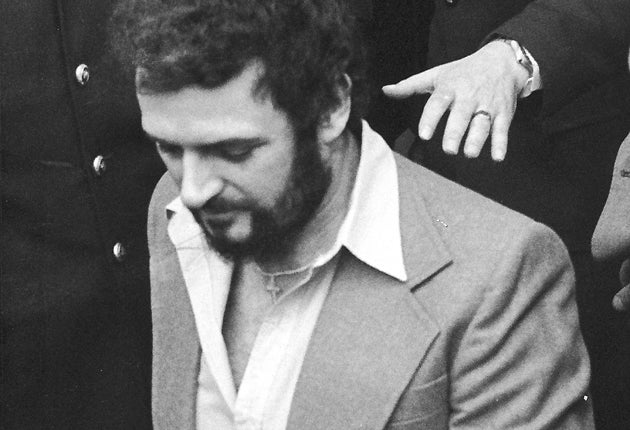Yorkshire Ripper will die in prison

Yorkshire Ripper Peter Sutcliffe, whose notorious murder campaign caused "widespread and permanent harm to the living", will never be released, a judge ruled today.
The serial killer of 13 women must serve a "whole life" tariff, said Mr Justice Mitting, announcing his decision at the High Court in London.
His judgment was welcomed by Richard McCann, whose mother Wilma was one of the victims of Sutcliffe's reign of terror.
Speaking outside the Royal Courts of Justice, Mr McCann said that for many years he had feared Sutcliffe might get released, but now felt a "sense of relief" at the decision. He described it as a "small victory for my mum" and the other victims.
In his ruling Mr Justice Mitting said: "This was a campaign of murder which terrorised the population of a large part of Yorkshire for several years.
"The only explanation for it, on the jury's verdict, was anger, hatred and obsession.
"Apart from a terrorist outrage, it is difficult to conceive of circumstances in which one man could account for so many victims.
"Those circumstances alone make it appropriate to set a whole life term."
Now known as Peter Coonan, the former lorry driver, now 64, from Bradford, West Yorkshire, was convicted at the Old Bailey in 1981.
He received 20 life terms for the murder of 13 women and the attempted murder of others in Yorkshire and Greater Manchester.
Mr Justice Mitting said he had read statements by relatives of six murdered victims: "They are each moving accounts of the great loss and widespread and permanent harm to the living caused by six of his crimes.
"I have no doubt that they are representative of the unspoken accounts of others who have not made statements.
"None of them suggest any term other than a whole life term would be regarded by them as appropriate."
He said he had no doubt that the "appropriate minimum term is a whole life term".
Sutcliffe is being held in Broadmoor top security psychiatric hospital after being transferred from prison in 1984 suffering from paranoid schizophrenia.
It was on July 5 1975, just 11 months after his marriage, that he took a hammer and carried out his first attack on a woman.
Sutcliffe is said to have believed he was on a "mission from God" to kill prostitutes - although not all of his victims were sex workers - and was dubbed the Yorkshire Ripper because he mutilated their bodies using a hammer, a sharpened screwdriver and a knife.
Mr Justice Mitting ruled that it was more likely than not that, if the Home Secretary had set a tariff for Sutcliffe, it would have been a whole-life tariff.
"The very clear impression which I have is that this case comes right at the top of the range of cases in which the Home Secretary has set a whole-life tariff.
"Only Rosemary West and Dennis Nilsen approach the number of victims murdered.
"Even they did not reach the total number of the respondent's victims."
The primary submission made on behalf of Sutcliffe was that the degree of his responsibility "was lowered by mental disorder or mental disability".
The diagnosis of psychiatrists who had considered his mental condition was that he was "suffering from encapsulated paranoid schizophrenia when he committed the crimes and that his responsibility for the 13 killings was, in consequence, substantially diminished".
But the judge said: "These propositions were, however, unquestionably rejected by the jury."
He ruled: "It is not, in my opinion, open to a judge, setting a minimum term, to go behind the verdict of the jury by concluding that, although the defendant's responsibility was not proved to have been substantially diminished, he should be given the benefit of the doubt for the purpose of setting the minimum term, by concluding that it might have been."
It was the opinion of psychiatrists that he "suffers from a chronic treatable mental illness for which he has been willing to accept appropriate treatment, which has successfully contained it for many years".
A report from Dr Kevin Murray, the psychiatrist who has been in charge of Sutcliffe's care since 2001, revealed that in July 1993 the killer was started on anti-psychotic medicine and "has persevered with it ever since".
The judge said: "He has been well-behaved and has posed no threat to other inmates.
"Jehovah's Witnesses who have befriended him for over 15 years are emphatic that he now shows remorse for his crimes."
Sutcliffe had "thrice been the subject of assaults, two of them serious".
"In the second assault, his right eye was put out. In the third, an attempt, in the event unsuccessful, was made to put out his left eye," said the judge.
Mr McCann, asked about Sutcliffe showing remorse, said: "I would argue strongly against that.
"Four or five years ago I wrote to Peter Sutcliffe to give him the opportunity of showing some remorse."
He had written in the hope of getting some kind of "closure".
He added: "I felt some remorse from him would help me. He did not take me up on the opportunity."